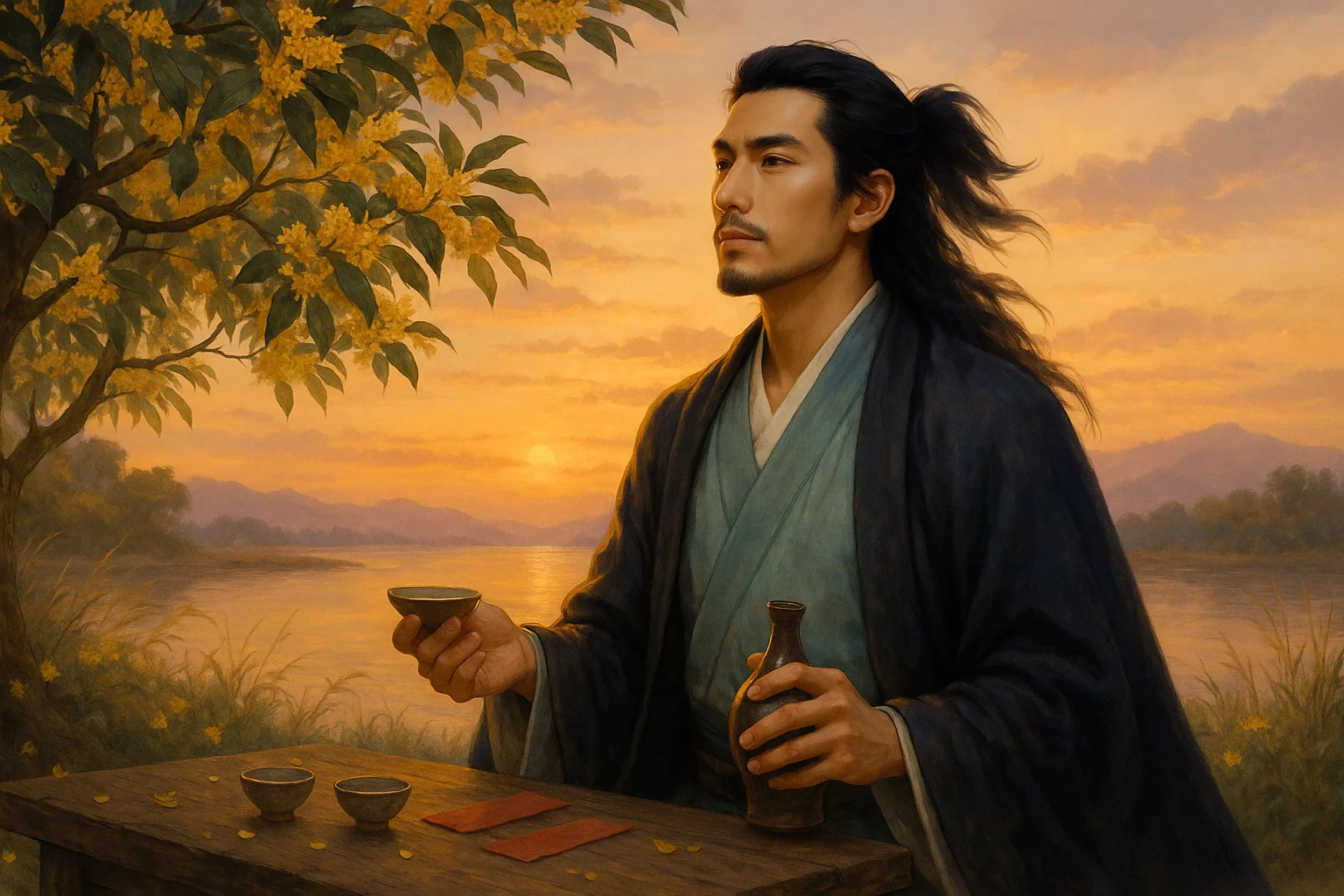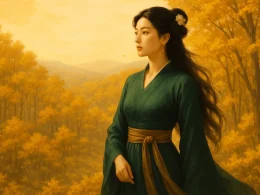Chrysanthemum wine fills our cups deep,
Plum-blossom horns blow far and wide—
Both in the capital we bide.
Gatherings and partings, swift and fleet,
Like lonely wild geese past cloud-veils fleeting,
Or duckweed on water meeting.
How can one not grieve?
So many times my soul takes flight,
Startled from dreams at midnight.
In nights to come, lovesick I'll be—
Dust follows your horse galloping free,
Moon chases your boat o'er the sea.
Original Poem
「柳梢青 · 送卢梅坡」
泛菊杯深,吹梅角远,同在京城。
聚散匆匆,云边孤雁,水上浮萍。教人怎不伤情。觉几度、魂飞梦惊。
刘过
后夜相思,尘随马去,月逐舟行。
Interpretation
Composed during Liu Guo's farewell to poet Lu Meipo in Hangzhou, this ci poem captures the poignant parting of kindred spirits in turbulent Southern Song times. Drawing imagery from Tao Yuanming and Li Qingzhao, it transforms seasonal motifs into metaphors for transience and devotion. Amidst political chaos, the work celebrates rare intellectual kinship while lamenting life's rootlessness, blending personal sorrow with historical resonance.
First Stanza: "泛菊杯深,吹梅角远,同在京城。"
Fàn jú bēi shēn, chuī méi jiǎo yuǎn, tóng zài jīng chéng.
We floated chrysanthemum wine in deep cups,
heard plum-blossom flutes sing from afar—
together in the capital.
The opening distills shared seasons into sensory icons. "Chrysanthemum wine" (泛菊杯深) evokes Double Ninth Festival camaraderie, its "deep cups" symbolizing overflowing trust. "Plum-blossom flutes" (吹梅角远) transmutes spring melodies into bonds stretching beyond physical presence—sound becoming connective tissue across distance.
"聚散匆匆,云边孤雁,水上浮萍。"
Jù sàn cōng cōng, yún biān gū yàn, shuǐ shàng fú píng.
Gatherings part like sudden storms—
a lone goose pierces cloud-veils,
rootless duckweed drifts on streams.
Here, meteorological and biological metaphors fuse. "Sudden storms" (聚散匆匆) captures friendship's fragility, while "cloud-piercing goose" (云边孤雁) visualizes solitary migration. "Rootless duckweed" (水上浮萍) completes the imagery of displacement—three lines painting life's impermanence through sky, water, and exile.
Second Stanza: "教人怎不伤情。觉几度、魂飞梦惊。"
Jiào rén zěn bù shāng qíng. Jué jǐ dù, hún fēi mèng jīng.
How could this heart not break?
Nights when my soul flees
through startled dreams.
Rhetorical anguish ("How could this heart not break?") bridges stanzas, its raw query contrasting with the first stanza's lyrical restraint. "Startled dreams" (魂飞梦惊) externalizes subconscious unrest—sleep offering no refuge from separation's ache.
"后夜相思,尘随马去,月逐舟行。"
Hòu yè xiāng sī, chén suí mǎ qù, yuè zhú zhōu xíng.
In midnight longing,
dust chases thy horse's hooves,
the moon trails thy boat.
The finale achieves sublime parallelism. "Dust chasing hooves" (尘随马去) materializes pursuit's futility, while "moon trailing boat" (月逐舟行) celestializes fidelity. Celestial and terrestrial elements unite in witness—nature itself participating in the farewell ritual.
Holistic Appreciation
Liu constructs a diptych of communion and severance. The first stanza's sensory richness ("chrysanthemum wine," "plum-blossom flutes") memorializes shared presence, while the second's elemental imagery ("dust," "moon") maps absence's geography. The work's brilliance lies in its vertical-horizontal tension: "cloud-piercing goose" (vertical exile) opposes "drifting duckweed" (horizontal displacement), creating dimensional desolation.
The closing celestial-terrestrial dyad ("dust/moon," "hooves/boat") resolves this tension—suggesting that true connection persists beyond physical separation when etched in nature's language.
Artistic Merits
- Botanical chronometry
Chrysanthemum (autumn) and plum blossom (spring) compress years of friendship into seasonal emblems. - Oneiric cartography
"Startled dreams" chart subconscious landscapes where separation defies physics. - Kinetic minimalism
"Dust chasing hooves" captures movement's essence through particulate motion. - Lunar constancy
"The moon trails thy boat" transforms satellite into loyal companion.
Insights
Liu's poem reveals how farewells alter perception: wine cups deepen, flute notes lengthen, and moonlight gains pursuing agency. This synesthetic shift models grief's transformative power—how loss sharpens senses while softening reality's edges.
For contemporary readers, the work offers an antidote to digital detachment. Its "dust chasing hooves" reminds us that true presence leaves tangible traces, while "moon trailing boats" suggests bonds outlast departures when rooted in cosmic witness.
Ultimately, the poem posits that parting's deepest comfort lies in nature's participation. When dust and moon become fellow mourners, solitude transforms into communal lament—a reminder that no farewell is truly solitary under shared skies.
About the Poet

Liu Guo (刘过 1154 - 1206), a native of Taihe in Jiangxi, was a ci poet of the Bold and Unconstrained School (haofang pai) during the Southern Song Dynasty. Though he remained a commoner all his life, wandering the rivers and lakes, he associated with literary giants like Lu You and Xin Qiji. His ci poetry is impassioned and heroic, and his verse is vigorous and forceful. Stylistically close to Xin Qiji but even more unrestrained, Liu Guo became a central figure among Xin’s poetic followers.












